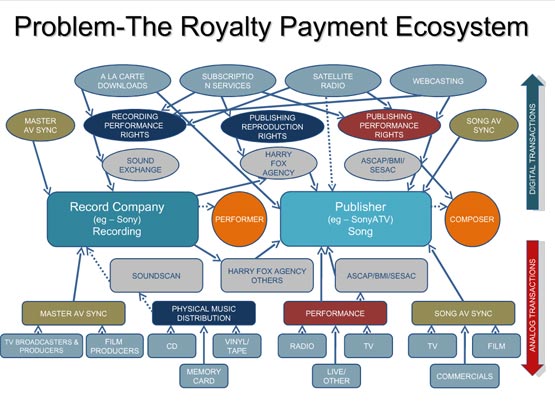
Technologists and music industry futurists have noted the need to refine and simplify digital licensing for quite some time. But despite a mantra of innovation, the music industry often moves slowly, especially with regard to revenue streams and licensing. However, the wheels may have begun turning— at last.
Last May, EMI Music Publishing announced that it was planning to bundle online mechanical and performance licenses (for EMI April) and offer them directly to online services. Previously these functions were handled by ASCAP. EMI Music Chairman/CEO Roger Faxon says in an open opinion letter published in Billboard (6/11) that publishers have to find ways to make it easier for digital services to license music.
“The simple fact is that as the representatives of the greatest songwriting and recording talent in the world, we as an industry have a duty to encourage digital platforms and services to come to a market for the benefit of creators and consumers alike. Yet…[we] cling to an existing licensing framework that does little to advance the cause of creators.”
In a companion article in the same publication writer Ed Christman notes three “competitive challenges” that could affect the way performing rights organizations in the U.S. (ASCAP, BMI and SESAC) do business, and the amount of money they are able to collect. EMI’s decision to direct license a bundle of mechanical and performance digital rights for example is quite likely to spread amongst other top level publishers and divert money away from PROs. “It’s a move other leading music publishers are expected to make,” says Christman.
Two other important factors likely to be felt by performing rights collectors are efforts to create pan-European licensing and a central/global database of repertoire information.
ASCAP CEO John LoFrumento tells Billboard, “We see the efficiency of licensing in bundles and feel strongly it will…result in a new business model over the next few years.” Both BMI’s Sr. VP Corporate Strategy Richard Conlon and SESAC’s President/COO Pat Collins also see change coming, but are optimistic about its impact as technology also creates efficiencies and new opportunities.
With respect to databases, LoFrumento says he would welcome the PROs consolidating their backroom functions. “The idea of multiple back offices with multiple personnel doesn’t bode well for us,” he says.
“Services don’t care what specific rights are called or which part of the value chain those rights sit within,” says Faxon. “They just want to get the permission to do what they want to do in a timely and efficient manner. Rather than forcing services to adapt to our processes it is incumbent on us to adapt to their needs. Only by doing so will we speed digital development. The existing licensing framework was not designed for a world in which music is omnipresent—its overhaul is essential.”

Category: Exclusive, Featured, Organizations, Publishing
About the Author
David M. Ross has been covering Nashville's music industry for over 25 years. dross@musicrow.comView Author Profile




